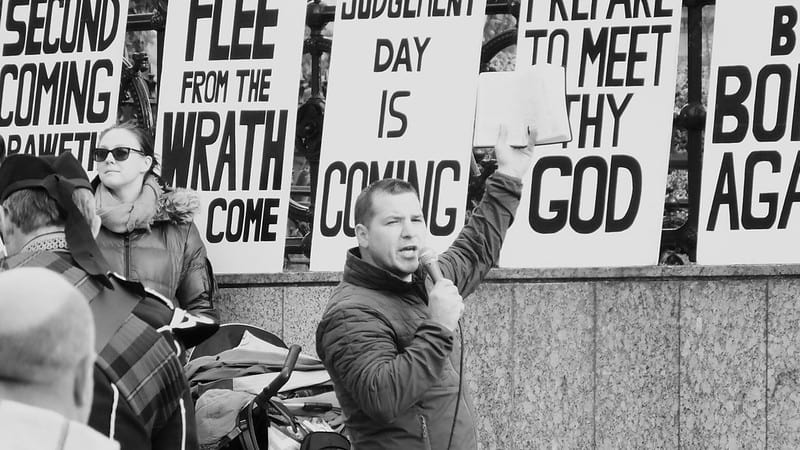
Photo by byronV2 on flickr [CC BY-NC 2.0]
“But you are a chosen race, a royal priesthood, a holy nation, God’s own people, that you may declare the wonderful deeds of him who called you out of darkness into his marvelous light.” —1 Peter 2:9
Last week we looked at what it means for us to reign as servant kings in and with Christ. Baptism also gives a us a share in Christ’s mission as prophet and priest.
For most of us, the idea of a prophet probably conjures up ideas of messages of doom and gloom, predictions about the future, and possibly someone standing on a street corner warning that the apocalypse is imminent. These are all applicable, up to a point, but they are only a piece of the prophetic mission. The Catechism of the Catholic Church gives a fuller description of the vocation of God’s prophets to the people of Israel, which also helps us understand what it means for us to be prophets:
“Through the prophets, God forms his people in the hope of salvation, in the expectation of a new and everlasting Covenant intended for all, to be written on their hearts. The prophets proclaim a radical redemption of the People of God, purification from all their infidelities, a salvation which will include all the nations.” —CCC 64
To be a prophet is to proclaim the truth about God and about humanity. This is a message of love and mercy and joy, but it also involves the “doom and gloom” reality that sin has real and potentially eternal consequences. Like the prophets of the Old Testament, we are called to proclaim God’s salvation through our words and our actions—and also to call people to repentance with both boldness and humility, “speaking the truth in love” (Ephesians 4:15). And yes, part of that truth is that this world will most certainly end—although we “know neither the day nor the hour” (Matthew 25:13), and the effectiveness of shouting on street corners is questionable.
But what about predicting future events? We are most familiar with the Old Testament prophets because they prophesied about a future messiah, and we see the fulfillment of those prophecies in Jesus. Jesus himself prophesied about the destruction of the Temple and great tribulation within one generation (meaning 40 years in Jewish thought; see Matthew 24:1-35), and in 70 AD the Romans utterly destroyed the Temple and ravaged Jerusalem.
Baptism doesn’t make all of us able to prophesy about the future. This kind of prophecy is a special charism, or gift, of the Holy Spirit (not to be confused with the seven Gifts of the Holy Spirit which we all receive). Prophecy, like other charisms, are special graces given to certain individuals for the building up of the whole Church (see CCC 799-801, 951, 2003).
Just as we distinguish between different aspects of the prophetic mission, we distinguish between two types of priesthood. “Christ is the source of all priesthood,” as St. Thomas Aquinas tells us, and so both the universal (or common) priesthood of all the baptized and the ministerial priesthood of Holy Orders participate in this one, unique priesthood of Christ. But they do so in categorically different ways:
“The common priesthood of the faithful is exercised by the unfolding of baptismal grace—a life of faith, hope, and charity, a life according to the Spirit.” —CCC 1547
Priests offer sacrifice. That is the nature of the priesthood in both the Old and New Covenant (and in any other religion with a priesthood, actually). The priests of the Old Testament offer sacrifices of grain, wine, animals, incense, etc. to God. Christ our High Priest offers the once for all, perfect sacrifice of Himself (Hebrews 4:14, 10:11-14). And the ministerial priesthood of the New Covenant—our priests—act in the person of Christ to re-present his one sacrifice in the Mass.
The sacrifice that we offer is the sacrifice of our own lives: our joys, our sufferings, our work, our prayers, our whole selves. We offer this sacrifice to God in a variety of ways every day, but we offer ourselves to him most fully and most perfectly when we unite our own self-offering to Christ’s perfect offering at Mass. This intentional union of ourselves to Christ’s sacrifice is the heart of what it means for us to participate in the Mass.
These roles are not optional, and they are not just for some of the baptized. Every single one of us is anointed and called to be a servant king as a sign of God’s own justice and righteousness, to proclaim the prophetic truth about God’s love, and to offer ourselves as “a living sacrifice, holy and acceptable to God” (Romans 12:1). This is the mission of our baptism.


Ashley, this is written so clearly and beautifully! Thank you for explaining the different types of priesthood and our role as baptized members of Christ. To be able to define and capture that entire theme in one blogpost is a gift!